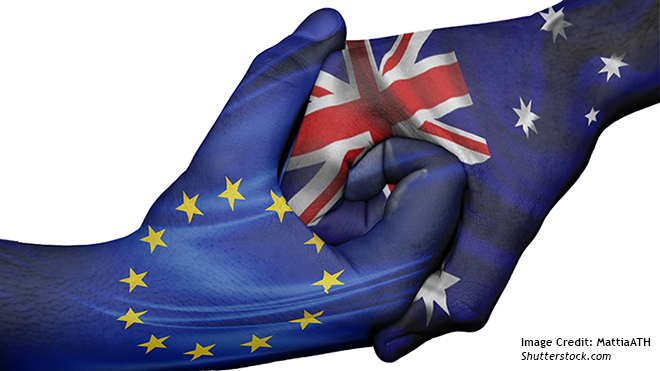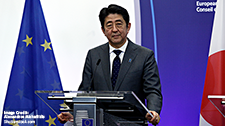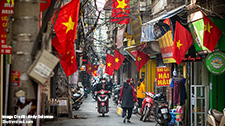Indo-Pacific as a Strategic Imperative for the EU: Whither Australia?

Jagannath Panda and Richard Ghiasy
No global actor can afford to fall short in contributing to a stable, peaceful, and prosperous Indo-Pacific—this particularly applies to a somewhat distracted European Union (EU). The EU should become more central to fostering order in the Indo-Pacific, arguably more than it realizes: It is not taken too seriously as a regional actor beyond economics.
It is critical for the EU to pay special attention to four principal strategic bearings: 1) International order probing and reform is mostly led by Indo-Pacific residents, 2) Indo-Pacific geo-economics will rule the roost only more, 3) The Indo-Pacific will largely determine (any) climate change reversion, and 4) The tech war will mostly play out in the Indo-Pacific. Thus, awareness of the Indo-Pacific’s strategic relevance in the EU must be broadened from a handful of member states and select strategic circles and to greater attention in the media, academic curricula, and the private sector. This will require public investment.
In dealing with these four bearings, Australia is a critical partner and can act as a bridge between the EU and the Indo-Pacific. Policy action is called for on several fronts and could include:
- The EU needs to act alongside Australia, but also ASEAN, China, India, Japan, the US, and other actors on how to best foster a peaceful, stable, and prosperous Indo-Pacific. The EU has experience with and knows the benefits of well-organized efforts to manage (international) order. One important item on the agenda could be trade rules and regulations, as several Asian states are increasingly more economically nationalistic.
- The EU must expand partnerships and deepen cooperation with countries like Australia, but also India, and Japan. The EU can engage with the Quad and initiatives like the Supply Chain Resilience Initiative (SCRI). The EU must make strategic room for itself amidst the plethora of minilateral and middle-lateral engagements evolving across the Indo-Pacific.
- The EU and Australia should also consider joining the Bay of Bengal Initiative for Multi -Sectoral Technical and Economic Cooperation (BIMSTEC). Attaining observer status in BIMSTEC will allow the EU and Australia to engage more deeply with South Asian states and build capacity and capability in securing the Bay of Bengal region.
- Australia and the EU, ranked as two of the foremost donors of development aid, respectively, possess opportunities for closer collaboration in engaging with Pacific Island states. If not, they risk ending up in a development aid competition between themselves and China. Pacific islands have incentives in that context to act in ways that promote that competition, and this is not beneficial to regional order or to EU/Australian interests. Indeed, this trend risks further entrenching China’s influence to the detriment of Australia and the EU.
- The EU must unite to address key challenges in the Indo-Pacific effectively. Currently, out of 22 members, only France, the Netherlands, Germany, the Czech Republic, and Lithuania have national Indo-Pacific strategies.
Related Publications
-
Navigating the Indo-Pacific: How Australia and the EU Can Partner for Peace, Stability, and Prosperity
To navigate the choppy waters of the Indo-Pacific, the EU and Australia must be on the same wavelength regarding shared interests in rules, values, and an open and liberal economic […]
-
Strong Europe-Japan Relations are a Legacy of Shinzo Abe
Abe was a firm proponent of strengthening a free, open and rules-based Indo-Pacific. Not only was he steering Japan away from total dependence on the U.S. for its security, but […]
-
Japan: No Indo-Pacific Order Without International Order
In April, Japanese Prime Minister Kishida Fumio, in his address to the joint meeting of the U.S. Congress, made the case for a stronger “global partnership” with the United States as part […]
-
Convergence in Vietnam, EU Interests a Harbinger of Indo-Pacific Order?
In March and April, Vietnamese Foreign Minister Bui Thanh Son’s nearly back-to-back visits to the U.S. and China highlighted Vietnam’s increasing penchant for delicate diplomacy with major powers amid the […]
-
EU-Thailand FTA Negotiations: IUU Fishing and Human Rights Remain Obstacles
Thailand’s fishing industry, which at its height saw as many as 200,000 migrant workers from neighboring Laos, Myanmar, and Cambodia caught in a brutal system of abuse, withered global criticism […]




